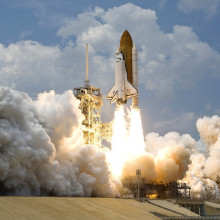If Earth were heavier, would rockets work?
"Is it true that if the mass of the Earth were greater, it would render our chemical rockets incapable of reaching orbit?" Listener Stephen launched this question at us, and so Martin Khechara went to find the answer...
In this episode

00:00 - QotW: Would a heavier Earth keep us from space?
QotW: Would a heavier Earth keep us from space?
Martin Khechara took on Stephen's question...
Martin - Since earliest history we have looked up and wondered what lay beyond the confines of Earth and marvelled at the stars and space. It wasn’t until 1961 when we managed to send the first person into space, when the Russian cosmonaut Yuri Gagarin orbited Earth on the Vostok spacecraft - closely followed by the American Alan Shepard Jr a month later. Would they have even made it up there if the Earth was a bit bigger? We asked Matteo Ceriotti, space systems engineer at the University of Glasgow.
Matteo - The answer is…it depends! A more massive Earth might not render rockets completely incapable, but it will certainly be harder to launch a given mass into orbit. Because a more massive Earth can pull harder on anything trying to leave.
Martin - And once the rocket reaches orbit, it needs to be orbiting at a certain speed to avoid falling back in.
Matteo - I considered an orbit such as the one of the International Space Station. To move 1 kg of mass from being stationary on the surface of the Earth, into orbit - which for the International Space Station is 420km above the surface - approximately 33 million Joules of energy are needed.
Martin - Since the first space rockets, this energy has almost entirely come from what is a fairly crude but controlled explosion, where hydrogen and oxygen are reacted to give upwards thrust. And all the energy in the fuel doesn’t go into pushing up the rocket, there’s a lot of light, heat and sound that come out as well. But 33 million Joules, theoretically, takes you up to the orbit of the space station. What if you’re launching off a much heavier planet?
Matteo - Let’s now imagine a new Earth which has twice the mass of our Earth, but is the same volume. In this case, the energy needed is approximately doubled (66 million Joules per kg).
Martin - Plus more and more energy needs more and more fuel. Eventually you couldn’t make a rocket big enough to hold it all! So ultimately, a heavier planet would make reaching orbit harder. Although - as Bored Chemist pointed out on our forum - if Earth was big enough, it would turn into a black hole. That would stop any rocket.
Related Content
- Previous Are the Covid-19 vaccines safe?
- Next Hitman 3 and AI in Chess










Comments
Add a comment